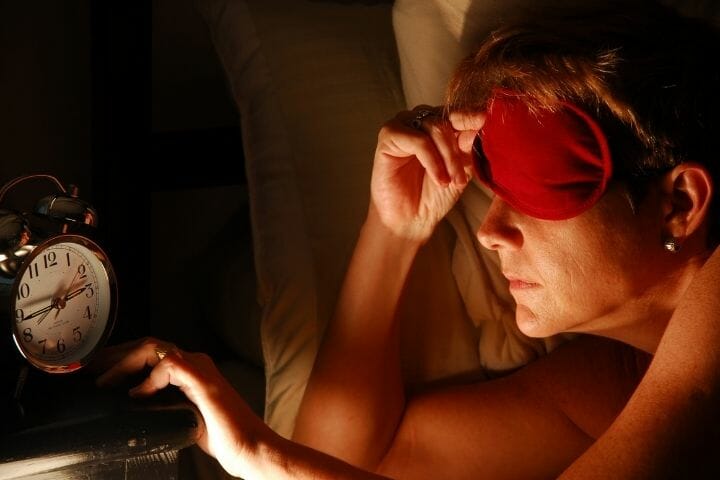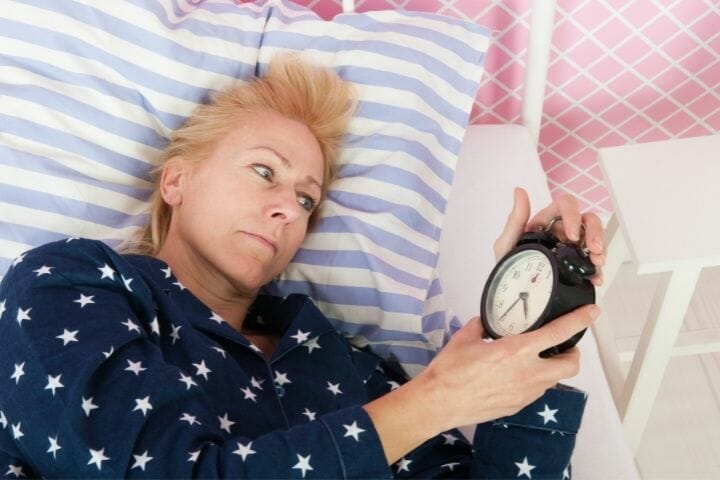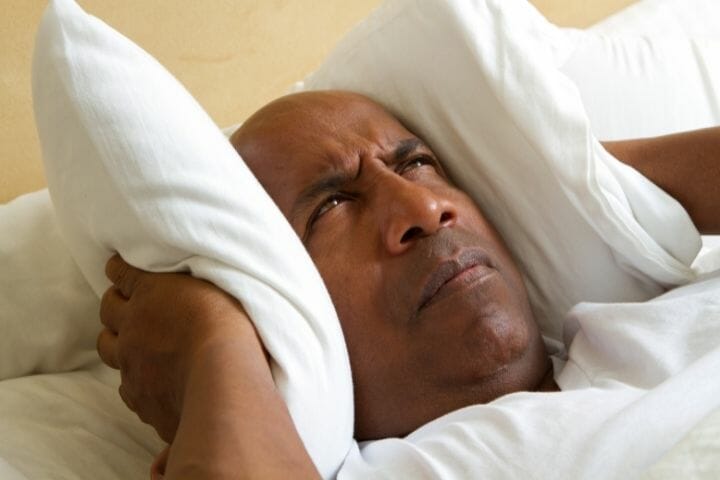If you are lying in bed awake again, you might have come to this article just browsing idly. Let’s share some simple ways to improve your sleep as you age so that you won’t have to do this next time!
Contents
Standard changes in our sleep schedules are common as we grow older, including being drowsy earlier in the day, awakening earlier in the morning, and having a less deep sleep. Nearly 50% of older adults above the age of 65 have insomnia.
Restless sleep, waking up exhausted each day, as well as other indicators of insomnia, on the other hand, are not a typical part of growing older. In terms of your physical and mental well-being, sleep is just as vital now as it was when you were young.

It is believed that getting a good night’s sleep helps to increase focus and memory formation and allows your system to recover any cellular damage that happens throughout the day. It also helps to rejuvenate your immune function, which helps to avoid disease.
Older persons who do not get enough sleep are more prone to depression, concentration and memory issues, excessive daytime drowsiness, and more nocturnal falls than those who do get enough sleep.
Sleep deprivation is associated with several major health concerns, a high risk of heart disease, diabetes as well as obesity, and breast cancer in women.
If you are experiencing age-related sleep issues, we can help you determine and solve them so that you can obtain a decent night’s sleep and improve the standard of your waking hours.
What Can Affect Your Sleep as You Age?
Find out what’s keeping you awake in order to obtain a decent night’s rest.
Medications- Several medications might keep you up at night. If you use any drugs, inform your doctor. There is a chance they will advise you to alter your dosage or when you take it. Perhaps they can even switch your prescription to one that does not affect your sleep.
Change- You’re more likely to experience substantial changes in your life as you become older. It is difficult to sleep if you are under a lot of stress, such as sickness, financial difficulties, or losing a loved one. Get help from a therapist if you’re struggling to cope with the pressures of life.
Retirement- After you retire, you may find that you have a lot more free time and become less engaged during the daytime hours. Your sleep-wake cycle may be disrupted as a result. To maintain your mind and body in motion, you may do anything from volunteering to going to the gym or learning a new skill to spending time with your loved ones.

Older Adults Are More Prone to Insomnia
Insomnia is the most common condition for those over the age of 60. It is difficult for people with this illness to get to sleep and to remain asleep once they do get to sleep. Sleep deprivation can persist for hours, days, weeks, or even years. Inability to fall asleep might mean:
- It takes a long time for you to fall asleep.
- wakIng up several times during the night.
- Not being able to get back asleep after waking up early
- Tired when you get out of bed in the morning
It’s common for sleeplessness to become a routine. Even before they go to bed, some people are worried that they won’t sleep. As a result, it may be more difficult to get to sleep and remain asleep.
Over-the-counter sleep aids may be used by certain older persons who have difficulty sleeping. Others may use sleeping aids prescribed by their doctor. Short-term usage of these drugs may be beneficial.
Getting a good night’s sleep may be easier if you have good bedtime practices.
You might like to read: Sleep Disorders Among Seniors – A Caregivers Guide
Sleep apnea
The breathing of individuals with sleep apnea is interrupted by small pauses in the process of sleep. During the night, these pauses may occur many times. If you don’t cure your sleep apnea, you may suffer from memory loss, stroke, or high blood pressure.
You may not even be aware that you have sleep apnea. If you snore loudly and are tired throughout the day, you might have sleep apnea.
Get checked out by a specialist who specializes in treating sleep apnea. You may have to adjust your sleeping posture to maintain an open airway. Patients who have sleep apnea are virtually always helped by CPAP therapy. Other options include the use of a dental tool or surgery.
Movement Disorders and Sleep
Older persons are more likely to suffer from uneasy legs syndrome, periodic limb movement disorder, and rapid eye movement sleep behavior disorder. You may be unable to get the rest you require if you suffer from one of these sleep problems.
A tingling, creeping, or pins-and-needles sensation may occur in one or both legs for those who suffer from restless legs syndrome. At night, this sensation is even worse. If you’re interested in learning more about RLS medications, speak with your physician.
As a result of the periodic limb movement disorder (PLMD), which occurs about 20 to 40 seconds during sleep, patients jerk and kick their legs, exercise, warm baths, and relaxation techniques can all help alleviate symptoms.
Rapid eye movement, or REM sleep behavior problems, can make it difficult to achieve a decent night’s sleep. Muscles cannot contract when you’re in REM sleep, so your body remains immobile. You can, however, twitch your muscles and interrupt your sleep if you suffer from a condition known as a REM sleep disorder.

Alzheimer’s Disease and Sleep—A Special Problem
It is common for the sleep habits of Alzheimer’s patients to be disrupted. There are two types of Alzheimer’s patients: those who sleep too much and those who don’t get enough sleep. One person may wake up several times in the middle of the night; another may roam or shout in the night.
Sleep deprivation affects everyone, not just Alzheimer’s patients. Caregivers may experience sleep deprivation, which leaves them exhausted from the tasks at hand.
Here are some things you can do to keep someone with Alzheimer’s disease safer while also allowing you to sleep better at night:
- Make sure there are no obstructions on the floor.
- Lock up all medications.
- In the bathroom, install grab bars.
- Put a gate in the way of the stairwell.
You might like to read Benefits of Melatonin for Seniors
Common causes of insomnia and sleep problems in older adults
Improper sleeping habits and sleeping conditions – A few examples include irregular sleep patterns, alcohol use before bed, and sleeping with the TV on. It’s important to have a peaceful environment in your bedroom, as well as calming nighttime routines to help you get to sleep.
Injuries or other health issues- Sleep disturbances can be caused by various medical disorders, including frequent urination, pain, arthritis, asthma, diabetes, osteoporosis, heartburn at night, and Alzheimer’s disease. Consult your physician if you have any health concerns.
Menopause and post-menopause- Sleep can be disrupted by hot flashes and night sweats for many women going through menopause. Even after menopause, women may still have sleep difficulties. A healthier diet and regular exercise during the day can assist.
Medications- Elderly persons are more likely to be prescribed many medications, and the mixture of these medications and their adverse effects can disrupt sleep. Whether you’re having trouble sleeping, ask your doctor if there’s anything your doctor can do to help.
A lack of physical activity- Sedentary lifestyles might cause you never to feel drowsy or be constantly tired. Good sleep can be aided by regular aerobic activity during the day.
Stress- Retiring, losing a loved one, or leaving a family home may all be stressful life events. A face-to-face conversation may do wonders to lift your spirits.

Lack of social engagement- To have a decent night’s sleep, you need to maintain your activity level high and engage in social, family, and job activities. Consider volunteering, attending a seniors’ club, or pursuing an adult learning class if you’re retired.
Sleep disorders- Older persons are more likely than younger adults to suffer from restless legs syndrome (RLS), as well as sleep breathing disorders, including snoring and sleep apnea.
Lack of sunlight- Sunlight deficiency Melatonin and your sleep-wake cycles are better controlled when exposed to bright sunshine. Make an effort to spend at least two hours a day outside in the sun. Using a light therapy box or leaving the blinds open will help you sleep better at night.
Tips To Improve Your Sleep
Avoid consuming Nicotine, Alcohol, Caffeine, and other substances that disrupt sleep
As any coffee fan knows, caffeine is a stimulant that may help you stay alert. To have a good night’s sleep, avoid caffeine for at least five to six hours before going to bed. Similarly, it is recommended that smokers avoid using cigarettes within three hours of going to bed.
Even though alcohol can assist in inducing sleep, it becomes a stimulant after some hours and reduces sleep quality and quantity overall. Avoid consuming alcohol within four hours of sleeping and restrict yourself to one to two drinks a day or fewer.
Daytime exposure to bright light should be increased
Your circadian rhythm is your body’s built-in timekeeper. It affects your brain, body, and hormones, allowing you to remain alert while also letting your body know when it’s time to wind down. The healthy functioning of your circadian rhythm is enhanced by exposure to strong light, such as that provided by direct sunshine during the day. Both amount and quality of sleep improve as a result of this.
In people with insomnia, exposure to light throughout the daytime improves sleep quality and duration. It also cut the time it took to fall asleep by 82%. An older population’s sleep length and efficiency were both increased by 80% after two hours of strong light exposure throughout the day.
Even if you have an average night’s sleep, you can benefit from daily light exposure because most studies focus on patients with severe sleep problems.

Limit your exposure to blue light during the evening
It’s better to be exposed to light during the day than at night because the effects reverse. Due to the circadian rhythm impact, your brain will believe it is still daytime. Melatonin, a hormone that aids in relaxation and deep sleep, is decreased due to this.
Electronic gadgets, such as cellphones and laptops, generate a lot of blue light, the most harmful. You may limit your blue light exposure at night by using various popular techniques. These are some examples:
- Put on a pair of blue light blocking spectacles.
- Use an app to limit the amount of blue light released by your PC or laptop.
- The app that suppresses blue light may be installed on your phone. For both iPhones and Android devices, these are accessible.
- Turn off the TV and any other bright lights at least two hours before you want to go to bed.
Create a Sleep-Inducing Ambience in Your Bedroom
Sleeping in a calm, dark, and cold setting can assist. In the daytime, why do you suppose bats cluster in caves? Earplugs or a “white noise” gadget can be used to reduce the loudness of outside noise. An effective way to wake up your brain is to block the light using heavy drapes, blackout shades, or an eye mask.
Keep the temperature in the room between 60 and 75 degrees Fahrenheit and the ventilation high. Also, make sure you have a cozy bed with soft cushions and a supportive mattress.
Avoid eating late at night
Sleep quality and the normal release of HGH and melatonin may be significantly affected by eating late at night. Your late-night snack may also have a factor in how well you sleep.
According to one research, people who ate a high-carbohydrate dinner four hours before bed went to sleep more quickly. A low carb diet also helps with sleep, suggesting that carbohydrates aren’t always required, especially if you’re used to eating low carb already.
Establish a Pre-Sleep Routine that Calms You Down
An hour or so before going to bed, spend some time doing something relaxing to help ease the shift from day tonight. Taking a bath, reading a book, watching television, or engaging in relaxation techniques might help you fall asleep.
Talking about emotional concerns, performing work, or engaging in other high-stress pursuits should be avoided. The stress hormone cortisol, which is linked to increased alertness and can be secreted by the body due to physical or psychological stress.
Try writing down your worries and then putting them away for a while.

Don’t Pay Attention to the Clock at Night
At any time of day or night, staring at a clock in your bedroom might make it more difficult to go off to sleep or wake up throughout the night. Turn the clock’s face away from your face. ‘
Listen to relaxing music or read a book if you wake up in the night and can’t go back to sleep. To maintain your internal clock in sync, keep the lighting dark. Return to your bed when your eyes are dropping, and you’re ready to sleep.
Get frequent exercise, but avoid it right before bed
One of the finest scientifically proven strategies to enhance your sleep and health is to exercise regularly. It can enhance all elements of sleep and has been used to alleviate insomnia symptoms. According to one research, exercise reduced the time it took for older individuals to fall asleep by nearly half and delivered an additional 41 minutes of sleep every night.
The exercise proved to be more effective than most medications in treating severe insomnia. Exercise shortened the time it takes to fall asleep by 55%, reduced nighttime waking by 30%, and lowered anxiety by 15%, all while lengthening overall sleep time by 18%. Even though regular exercise is essential for restful sleep, exercising too late in the day might interfere with that rest.
This is partly due to the increased alertness and epinephrine and adrenaline produced by exercise. In other research, no detrimental effects were found. Therefore it appears to be a matter of personal preference.
Don’t consume any drinks before going to sleep
The medical word for excessive nighttime urine is nocturia. It impacts the quality of your sleep and the amount of energy you have during the day. Although some people are more sensitive than others, drinking many drinks right before bed might cause comparable sensations.
Even while being hydrated is essential, it’s best to cut back on fluids in the evenings to avoid dehydration. At least one to two hours before going to bed, refrain from drinking anything liquid. Preventing nighttime awakenings by using the restroom shortly before bed will help you have a better night’s sleep.

Wrap Up
All individuals, regardless of age, require at least 7 to 8 hours of sleep every night. Keep a sleep journal and bring it to your doctor if the advice above or your efforts to cure your sleep problems fail.
Keep a diary of your alcohol, caffeine, and nicotine consumption, as well as a record of your prescriptions, workouts, dietary adjustments, and any recent life changes and stressors. If your insomnia affects your emotions and health, your doctor may recommend you to a sleep expert or a cognitive-behavioral therapist for additional therapy.
Please let us know if there’s anything you think we’ve missed or if you have any suggestions for how we can improve this guide. Please share it with others and mention us on your social networking sites if you appreciate the information.
